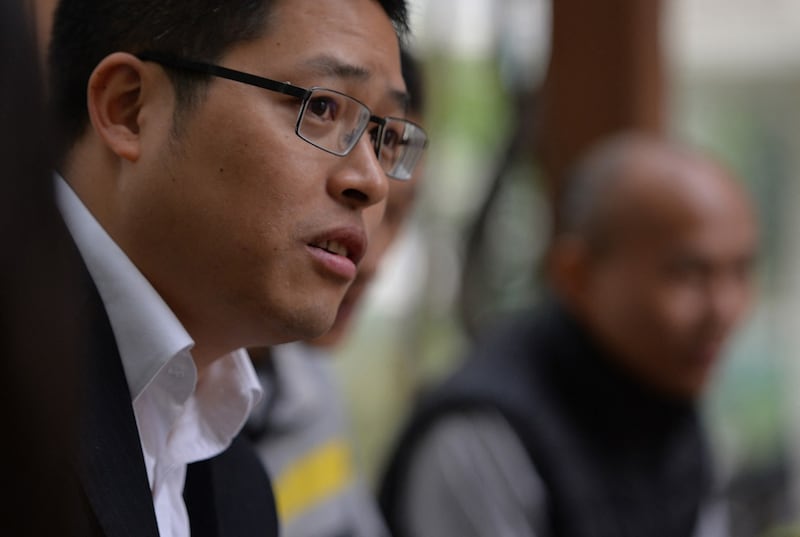Wang Henan, the wife of jailed press freedom activist Wang Aizhong, says her employer is trying to get her to quit her job due to her husband's status as a political prisoner, and has barred her from working further shifts as a flight attendant.
She says the move means she is effectively being punished by association with her husband, a tactic that is commonly used by the authorities as a retaliatory measure against dissidents and peaceful critics of the regime.
Last May, Wang Aizhong was handed a three-year sentence by the Tianhe District People's Court in the southern province of Guangdong after he retweeted foreign media reports on Chinese social media platforms. The court found him guilty of "picking quarrels and stirring up trouble," a charge frequently used to target critics of the ruling Communist Party.
The court found that Wang had "used social media platforms to quote and repost false reports in the foreign media about China's political system." Wang, 46, also stood accused of "adding false information that seriously damaged China's image" and of causing "serious public disorder," it said.
Wang Henan said her company – which she has named on X as Shenzhen Airlines – has since tried to get her to quit her job and grounded her, meaning she no longer gets any shifts as a flight attendant.
"My employer ... asked me to come back and work as ground crew," she said. "That means sitting in the office from 8.30 a.m. to 5.00 p.m. every day ... making about 2,000-3,000 yuan a month. If I fly, I can make up to 10,000 yuan a month."
"Everyone knows why they have grounded me," she said. "The authorities have already approached them, and they are weak, so they will definitely do as they're told."
Serving alongside her husband
Wang Henan's boss has told her "it would be better if you were to quit of your own accord," she said, adding that her income has plummeted since Wang was sentenced.
"This is actually the same as serving a prison term alongside him," she said. "My husband is my husband and I am me, but I don't get to have a job because of what they think of my husband?"

Wang Aizhong is scheduled to be released in May 2024, as time already served in pretrial detention will be deducted from the sentence.
He was initially detained at his home in Guangdong's provincial capital, Guangzhou in May 2021, and his apartment searched by police, who confiscated reading materials and computer devices.
He had been a key activist during protests in Guangzhou in January 2013 that were sparked by the rewriting of a New Year's Day Southern Media Group editorial calling for constitutional government.
Activists, journalists, and academics faced off with the authorities for several days after the Southern Weekend newspaper was forced to change a New Year editorial calling for political reform into a tribute praising the Chinese Communist Party.
The protest was one of the first overt calls by members of the public for political freedom since large-scale pro-democracy demonstrations were crushed in a military crackdown in Beijing's Tiananmen Square in 1989.
He was later detained in 2014 on suspicion of the same charge, shortly before the 25th anniversary of the June 4, 1989, Tiananmen massacre.
Protest over Latern Festival restrictions
Meanwhile, a rights activist in Guangzhou's Shunde district has issued a protest over ongoing restrictions on her freedoms to mark Lantern Festival on Feb. 24.
"Today is Lantern Festival in the Year of the Dragon, Feb. 24, 2024," Li Biyun said in a complaint letter submitted to the Shunde district government, the Weiquanwang rights website reported on Monday. "It's the second anniversary of my imprisonment, and only the fifth time I have been allowed to go out."
"Today, I went to the Shunde District Party Committee and the district government to request the return of my personal freedom, and to be allowed to take the bus and the subway," she said. "The police threatened to kidnap me, so if I go missing, pay attention. It will be on the orders of the district leaders."
Li, who is disabled following repeated torture while in prison, first came to the attention of the authorities when she joined a nationwide movement of activists seeking to run as independent candidates in elections for district People's Congresses.
The polling process that is theoretically open to all, but tightly controlled in practice by the Communist Party.
"She cannot take care of herself and is in urgent need of medical treatment," Weiquanwang reported. "Yet she has been held under house arrest by the authorities and is often violently prevented from going out."
Translated by Luisetta Mudie. Edited by Malcolm Foster.
